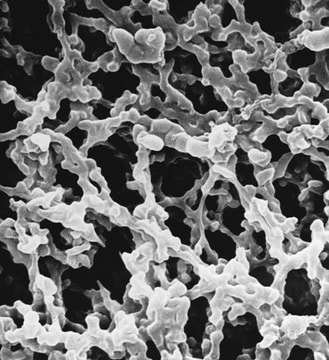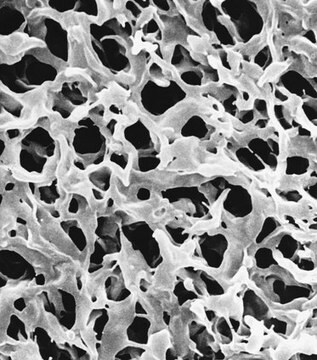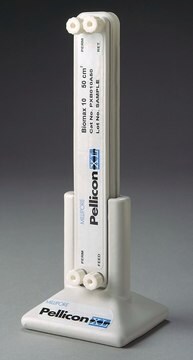VCWP04700
MCE Membrane Filter, 0.1 μm Pore Size
MF-Millipore™, filter diam. 47 mm, hydrophilic
Synonym(s):
MF-Millipore™ Membrane Filter, 0.1 µm pore size
About This Item
Recommended Products
material
mixed cellulose esters (MCE) membrane
plain filter
white filter
Quality Level
Agency
in accordance with ASTM® D5755
description
47 mm diameter, mixed cellulose esters (MCE) membrane, hydrophilic, white, 100 discs
sterility
non-sterile
feature
hydrophilic
manufacturer/tradename
MF-Millipore™
Millipore
sustainability
Greener Alternative Product
parameter
0.4 L/min-cm2 air flow rate
1.5 mL/min-cm2 water flow rate
75 °C max. temp.
diam.
47 mm
filter diam.
47 mm
thickness
100 μm
gravimetric extractables
1.5%
refractive index
n/D 1.5
matrix
MF-Millipore™
pore size
0.1 μm pore size
74 % porosity
capacity
150 μg/cm2 binding capacity (protein)
bubble point
≥14.1 bar, air with water at 23 °C
greener alternative category
shipped in
ambient
Looking for similar products? Visit Product Comparison Guide
General description
MF-Millipore filters without Triton surfactant contain minimum amounts of wetting agent and have a lower water extractable content than standard MF-Millipore filters.
Features & Benefits:
- Versatile filter for biological and environmental monitoring applications
- Available in a range of pore sizes, colored black or white, with or without a gridded surface
- Compatible with ethylene oxide, gamma irradiation, and autoclave sterilization methods
Application
Other Notes
- Organism Retention: Microorganism
- Mode of Action: Filtration (size exclusion)
- Application: General laboratory filtration
- Intended Use: Retention or removal of biological contaminants
- Instructions for Use: Sterilizing filtration of a liquid through a membrane with a 0.2 μm (or smaller) pore size effectively removes biological contaminants, including bacteria, mold and yeast. For the selective retention of larger biological contaminents, liquid filtration through membranes with 0.45 μm (or larger) pore sizes may be used to trap and support microorganism growth for subsequent culture and analysis
- Storage Statement: Store in dry location away from heat source
- Disposal Statement: Dispose of in accordance with applicable federal, state and local regulations.
Legal Information
Signal Word
Danger
Hazard Statements
Precautionary Statements
Hazard Classifications
Aquatic Chronic 3 - Flam. Sol. 1
Storage Class Code
4.1B - Flammable solid hazardous materials
WGK
WGK 3
Regulatory Listings
Regulatory Listings are mainly provided for chemical products. Only limited information can be provided here for non-chemical products. No entry means none of the components are listed. It is the user’s obligation to ensure the safe and legal use of the product.
FSL
Group 5: Self-reactive substances
Nitric esters
Hazardous rank I
1st self-reactive materials
JAN Code
VCWP04700:
Certificates of Analysis (COA)
Search for Certificates of Analysis (COA) by entering the products Lot/Batch Number. Lot and Batch Numbers can be found on a product’s label following the words ‘Lot’ or ‘Batch’.
Already Own This Product?
Find documentation for the products that you have recently purchased in the Document Library.
Customers Also Viewed
Our team of scientists has experience in all areas of research including Life Science, Material Science, Chemical Synthesis, Chromatography, Analytical and many others.
Contact Technical Service



